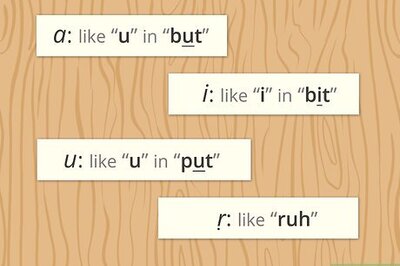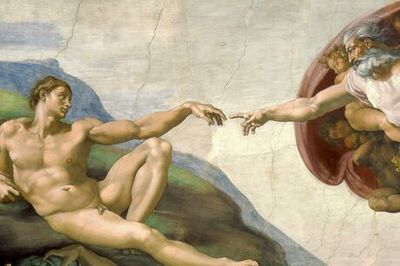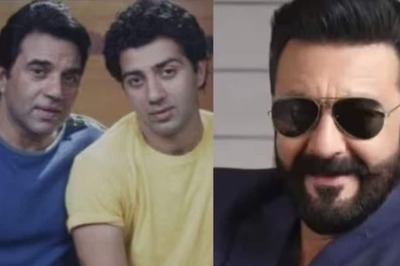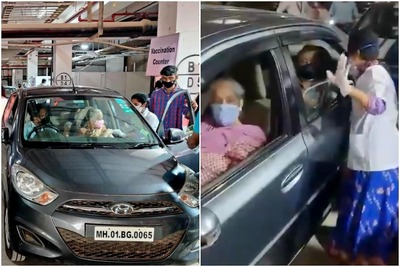
views
Saadat Hasan Manto had once written, “Literature and film, in my opinion, are like saloons where bottles have no labels. I want to taste each one myself and figure out which is what. If I'm denied this by labeling, then my entertainment is considerably lessened.”
I wonder what Manto must have thought had he 'tasted' Nandita Das' film that tells the story of his own life by interweaving narratives of his short stories with real-life events that impacted him deeply. Maybe he would have liked the 'realism' of Nandita's cinematic world -- the filmmaker brings back the late 1940s in vivid and intricate details-- or perhaps he wouldn't have been too pleased with the uneventful, almost abrupt ending, given his fondness for dramatic ends. It's hard to say.
But, spend two hours watching Nandita's film (and I recommend you do), and you'd realize, that Nandita is a masterful storyteller herself. She presents a searing portrait of a prolific writer by giving us an insight into his psyche through his stories and showing us how hard life must be for someone who holds up a mirror to the society.
Anyone who had read his stories will tell you that what makes Manto such a fine storyteller and puts him up in the ranks of Guy De Maupassant, Anton Chekhov, and O.Henry, isn't just his writing techniques (and his rhythmic proses) but also his keen observational skills.
Manto is known for his scathing social commentary, especially in his representation of the marginalized, be it that of the mentally challenged in Toba Tek Singh or a sex worker in Hatak. However, what is particularly interesting about Manto's body of work is his portrayal of women.
Manto gave India and Pakistan some of the best feminist literature that came out during partition, along with Ismat Chughtai of course -- a contemporary and a friend of the author.
In his short story, Thanda Ghost, (which also feature in the film) we meet Kalwant Kaur, who doesn't adhere to the gender role that's often ascribed to women by the society. She is a sexual being, and unlike other women characters written during that time, she is neither submissive nor coy while expressing her sexual desires. Manto's Kalwant is aggressive and violent as well, which are characteristics that the society mostly associates with men.
Manto never shied away from calling out the inherent gender biases. In his own words, "A man remains a man no matter how poor his conduct. A woman, even if she were to deviate for one instance, from the role given to her by men, is branded a whore."
In fact, in his personal relationship too, he didn't believe in adhering to gender roles. His marriage to Safia was arranged, but they soon became friends and came to love and respect one another. Manto insisted that Safia addressed him by his first name, and often cooked, and ironed her saris for her. He even braided her hair when she fell ill. Like most spouses of writers, Safia was the first one to read all of Manto's stories, and her thoughts and comments were important to him.
However, despite his sensitivity, the happy years that the couple shared were few. They were happy mostly during the period they lived in Bombay where Manto wrote movie scripts at Bombay Talkies. Even there, Manto did not duck out from calling out those men who exploited women in the movie business and the societal hypocrisy which often branded women who worked in the showbiz as promiscuous.
The writer had once famously written, “To those men who say that women from “good families” must come into the world of cinema, I have this question: What is it that you mean by “good?” A woman, who honestly puts her wares on display, and sells them without an intention to cheat, is such a woman not virtuous?”
For someone who stood up so often for women's rights, it is strange that he would be accused of using exploitative story tropes, and female sexuality to sell books. But, the writer was accused of obscenity multiple times. At one instance, he even had to pay a fine of Rs 300 to stay out of jail. However, what society and in fact, even members of progressive writers association considered 'obscene' was in fact, an integral part of his storytelling.
He was often accused of describing the female body in great detail. Also, he was one of those few writers back then who called 'breasts' as 'breasts' instead of using some suggestive language to talk about them. However, read Manto, and you would realize that he didn't do anything without a reason. A short story writer, who is frugal with his descriptions, he described women's physicality in detail, only when he was trying to make a point about it.
In his short story Mozail, he describes the physicality of a Jewish woman very vividly. In the story, a Sikh man, Tarlochan, confesses his love for her, but she rejects him. He then gets engaged to another girl. During riots, when Mozail, the Jewish woman, learns that a plot is being hatched to kidnap Tarlochan's fiancee, she quickly rushes to her place and assists the couple to flee. She gives her robe to the other girl to hide her religious identity, and then proceeds downstairs, naked, to confront the rioters. In this story, Mozail's nakedness is used to make a point. At the end, when Tarlochan offers his turban to cover Mozail's body, she refuses to take it, saying she doesn't want to put on a religious garb. Mozail is no damsel in distress. She is the kind, powerful protector of Tarlochan and his fiancee. She is the hero of Manto's story.
In another one of Manto's acclaimed tales called Khol Do,(featured in the film) we meet an old man, who after reaching Pakistan, and recovering the brutal death of his wife, in the hands of rioters, discovers that his seventeen-year-old daughter, Sakina, has gone missing.
He asks local boys who had been rescuing people to look for Sakina and gives her physical description. After some days, when he spots those boys again, he asks them eagerly if they have any news of Sakina. They all reassure him that his daughter will be found soon.
He eventually does find his daughter himself, in a hospital. He initially thinks she is dead, but when the doctor asks him to open the window so that he can examine her properly, he realizes that she is alive. He is so ecstatic with joy that he doesn't realize that his daughter had pulled down her trousers to show the atrocities that she had endeavored not just in the hands of the rioters, but also in the hands of the local boys, who found her long back.
In the short story, Manto describes the scene where Sakina meets these local boys in vivid details. No, there isn't a rape scene, he just shows his readers that the local boys gives her food and clothes and reassures her that they would take her to her father. They make her trust them and board a lorry. That's where the scene end. But, when you reach the end of the story, you know how the lorry ride may have ended. This story shows another good thing about Manto's writing. He never brings the shame onto female victims.
In Hatak, we meet Saugandhi, who is a sex worker. Manto leaves aside moral judgments and lets his readers know how hard she works to make a living. There is a particularly heart-warming scene in the story where Saugandhi, while combing her hair and looking at the mirror tells herself, "the society did not treat you fairly Saugandhi." She is a lovely character, who doesn't indulge in self-pity and states things as they are. She is a creation of Manto.
Like Manto, another author who was questioning gender roles and power structure during that time was Ismat Chughtai. They were friends who used to disagree on a lot of things but wanted the best for each other. In his essay on Chughtai, Manto had written, "People say, Ismat is a bad woman, a witch. Asses! She has distilled the essence of a woman’s soul ...And these people judge her on the basis of their abominable morality. They should be made to stand up before a cannon and be shot through the head."
He was exceedingly fond of her. But, during their first meeting, he was sorely disappointed to meet the writer of Lihaaf. Manto had asked her, why did she add a pointless line at the end of the story, hearing which she flustered so badly, that he dropped the idea of having any discussion on Lihaaf with her.
He apparently told himself, “The wretch turned out to be a mere woman after all!” --a thought which he later reconsidered and corrected (although not completely, which makes you question the limits of his liberal ideas about gender as well). Talking about Chughtai's work, Manto had said, "Ismat’s identity as a woman has left its deep imprint on all branches of her writing, which guides us at every step in our appreciation of her art. Her merits and inadequacies as a writer... cannot be seen in isolation from her gender."
While Manto moved to Pakistan after partition, despite his repeated pleas, Chughtai continued to live in India. They both continued to write stories -- mostly about strong, relatable women-- from the other sides of the border for as long as they lived.



















Comments
0 comment